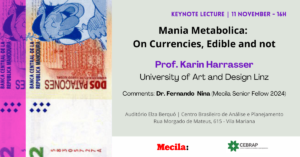Cebrap - São Paulo
Keynote lecture – Mania Metabolica. On Currencies, Edible and not
Prof. Karin Harrasser (University of Arts Linz)
Comments: Dr. Fernando Nina (Mecila Senior Fellow 2024)
11 november – 16h
Auditório Elza Berquó | Centro Brasileiro de Análise e Planejamento
Rua Morgado de Mateus, 615 – Vila Mariana

In her talk, Karin Harrasser (University of Arts Linz) will discuss the dynamics of currencies, of media of exchange in a perspective of longue durée, and of an ecology of practices. She will relate historically specific versions of general purpose money – money for universal use, such as the Spanish Silver-Peso and the U.S. dollar, to self-restricting currencies: currencies that are more tightly knit into the »web of life«, into local economies and ecologies and into cultural systems. She will also discuss the interplay of situated money-regimes with generalized, globalized media of exchange. The first figure in the discussion will be ›edible currency‹. Further on she will discuss currencies that are more closely linked to products of consumption than common general purpose money (e.g. coupon-currency, vouchers such as the Argentinian Patacón), money that is not primarily part of the sphere of exchange, but can rather be assigned to an ecology of practices of preservation and formation of the organism and its preconditions. She argues that economic practices and theories since the Early Modern period are entangled with the need to come to terms with crises and contingencies of colonial economies and ecologies. By way of this focus she will develop a model of cultural violence as metabolic: transformations, that necessarily pass through phases of destruction.
Karin Harrasser is Professor of Cultural Theory at the University of Arts Linz. After studying history and German language and literature, she received her doctorate in 2005 with a dissertation on the narratives of digital cultures at the University of Vienna. This was followed by a research assistant position at the Academy of Media Arts Cologne and various guest professorships in Germany and Colombia. Afterwards habilitation at the Humboldt University in Berlin (book: Prothesen. Figuren einer lädierten Moderne) (published 2016). In addition to her academic activities, she has been involved in various artistic and curatorial projects, e.g. at Kampnagel Hamburg, Tanzquartier Wien or with MAPA Teatro and the Colombian Truth Commission in Bogotá. Her research currently focuses on asymmetrical cultural transfers between Europe and South America and the relation between globalization and contemporary history. Recent books: Surazo. Monika und Hans Ertl: Eine deutsche Geschichte in Bolivien (2022), Gegenentkommen (2023).